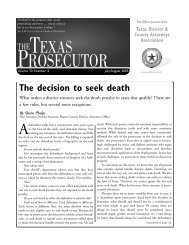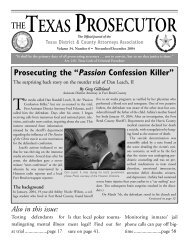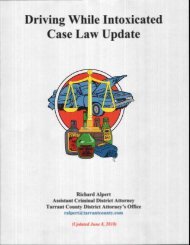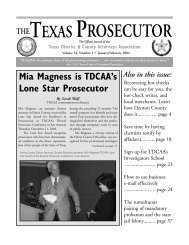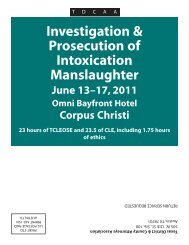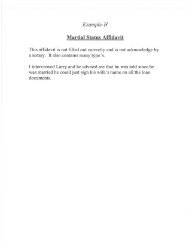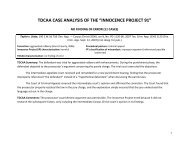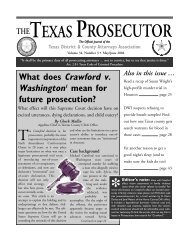Driving While Intoxicated Case Law Update - Texas District ...
Driving While Intoxicated Case Law Update - Texas District ...
Driving While Intoxicated Case Law Update - Texas District ...
You also want an ePaper? Increase the reach of your titles
YUMPU automatically turns print PDFs into web optimized ePapers that Google loves.
it is." Court of Criminal Appeals in this opinion says ff rs not an element and the Sfafe does not need<br />
to offer evidence of that conviction to the jury, but rather jusf needs to submit the proof to the trial<br />
court which it did in fhr.s case.<br />
Bower v. State, 77 S.W.3d 514 (Tex.App.-Houston [1"tDist.] 2002, pet ref'd).<br />
This was a felony DWI trialwhere the Defendant stipulated to his prior DWI's and pled true to the<br />
enhancements. The enhancements did not contain the offense dates of the priors and no evidence<br />
of the offense dates was presented by the State during the guilUinnocence phase of the trial. The<br />
defendant argued this was a failure of proof and cited Renihaw and Smith. This Court finds that<br />
the reasoning of those two opinions is wrong in that the accusation of two priors is all that is needed<br />
to give the Court jurisdiction. lt distinguishes 12.42(d) from 49.09(b). lt also points out that if the<br />
State's priors were stale, the proper remedy would have been to move to quash the indictment,<br />
object to the admission of the priors, or ask for a lesser charge of misdemeanor DWl.<br />
<strong>While</strong> we wait for the Court of Criminal Appeals to address this issue, it would seem prudent<br />
to go ahead and mention at least one of the offense dates in the body of our stipulations in<br />
felony DWI cases.<br />
3. THE 10 YEAR RULE FOR OFFENSES FROM 9.01.01 TO 8-31.05<br />
Getts v. State, 155 S.W.3d 153 (Tex.Crim.App.2005).<br />
Ihls case fel/s us how to apply the 2001 amendment to the DWI statute to the question of how to<br />
calculate in prior DWI convictions to bump the charge up to a felony under 49.09 of the lexas Penal<br />
Code. The Court holds that prior DWI convictions are available for enhancement so long as they<br />
are within ten years of each other, calculating that time period by using fhe c/osesf possrb/e dates,<br />
whether that be the offense date, date of sentencing, or date of release from sentence, including<br />
probation or parole.<br />
For example, if a defendant has a 2005 DWt arrest and his record includestwo priorsfrom 1987 and<br />
1993, this case should be filed as a felony DWI because fhe two prior DWI offenses are within ten<br />
years of each other-even though more than ten years time has lapsed since the priors and the<br />
current offense.<br />
4. THE 10 YEAR RULE'S DEMISE DOES NOT VIOLATE EX POST FACTO<br />
LAW<br />
Effective September 1, 2005, the legislature repealed subsecfion s (d) and (e) of Section 49.09 of<br />
the <strong>Texas</strong> Penal Code. This means that there are no age limitations on the use of DWI priors to<br />
enhance fo C/ass A or Felony DWls.<br />
Crocker v. State, 260 S.W.3d 589 (Tex.App.-Tyler 2008, no pet.).<br />
This appealwas based on the argument that the statute that did away with the ten year rule was<br />
138



